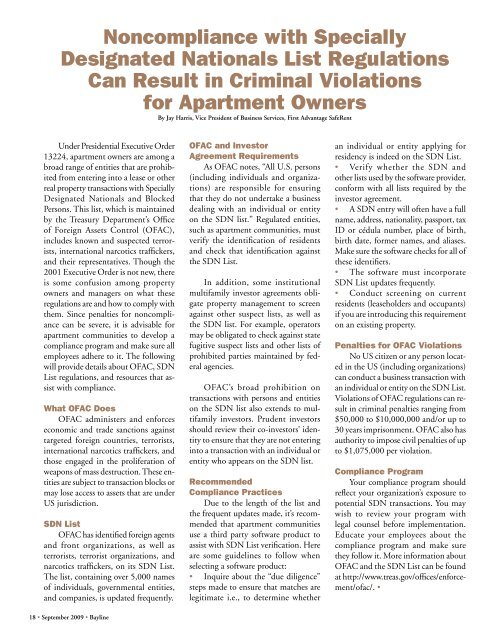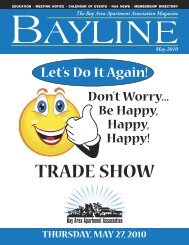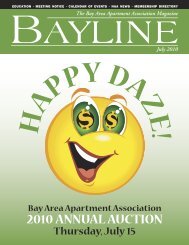Bayline September 09.indd - Bay Area Apartment Association
Bayline September 09.indd - Bay Area Apartment Association
Bayline September 09.indd - Bay Area Apartment Association
You also want an ePaper? Increase the reach of your titles
YUMPU automatically turns print PDFs into web optimized ePapers that Google loves.
Noncompliance with Specially<br />
Designated Nationals List Regulations<br />
Can Result in Criminal Violations<br />
for <strong>Apartment</strong> Owners<br />
By Jay Harris, Vice President of Business Services, First Advantage SafeRent<br />
Under Presidential Executive Order<br />
13224, apartment owners are among a<br />
broad range of entities that are prohibited<br />
from entering into a lease or other<br />
real property transactions with Specially<br />
Designated Nationals and Blocked<br />
Persons. This list, which is maintained<br />
by the Treasury Department’s Office<br />
of Foreign Assets Control (OFAC),<br />
includes known and suspected terrorists,<br />
international narcotics traffickers,<br />
and their representatives. Though the<br />
2001 Executive Order is not new, there<br />
is some confusion among property<br />
owners and managers on what these<br />
regulations are and how to comply with<br />
them. Since penalties for noncompliance<br />
can be severe, it is advisable for<br />
apartment communities to develop a<br />
compliance program and make sure all<br />
employees adhere to it. The following<br />
will provide details about OFAC, SDN<br />
List regulations, and resources that assist<br />
with compliance.<br />
What OFAC Does<br />
OFAC administers and enforces<br />
economic and trade sanctions against<br />
targeted foreign countries, terrorists,<br />
international narcotics traffickers, and<br />
those engaged in the proliferation of<br />
weapons of mass destruction. These entities<br />
are subject to transaction blocks or<br />
may lose access to assets that are under<br />
US jurisdiction.<br />
SDN List<br />
OFAC has identified foreign agents<br />
and front organizations, as well as<br />
terrorists, terrorist organizations, and<br />
narcotics traffickers, on its SDN List.<br />
The list, containing over 5,000 names<br />
of individuals, governmental entities,<br />
and companies, is updated frequently.<br />
18 • <strong>September</strong> 2009 • <strong><strong>Bay</strong>line</strong><br />
OFAC and Investor<br />
Agreement Requirements<br />
As OFAC notes, “All U.S. persons<br />
(including individuals and organizations)<br />
are responsible for ensuring<br />
that they do not undertake a business<br />
dealing with an individual or entity<br />
on the SDN list.” Regulated entities,<br />
such as apartment communities, must<br />
verify the identification of residents<br />
and check that identification against<br />
the SDN List.<br />
In addition, some institutional<br />
multifamily investor agreements obligate<br />
property management to screen<br />
against other suspect lists, as well as<br />
the SDN list. For example, operators<br />
may be obligated to check against state<br />
fugitive suspect lists and other lists of<br />
prohibited parties maintained by federal<br />
agencies.<br />
OFAC’s broad prohibition on<br />
transactions with persons and entities<br />
on the SDN list also extends to multifamily<br />
investors. Prudent investors<br />
should review their co-investors’ identity<br />
to ensure that they are not entering<br />
into a transaction with an individual or<br />
entity who appears on the SDN list.<br />
Recommended<br />
Compliance Practices<br />
Due to the length of the list and<br />
the frequent updates made, it’s recommended<br />
that apartment communities<br />
use a third party software product to<br />
assist with SDN List verification. Here<br />
are some guidelines to follow when<br />
selecting a software product:<br />
• Inquire about the “due diligence”<br />
steps made to ensure that matches are<br />
legitimate i.e., to determine whether<br />
an individual or entity applying for<br />
residency is indeed on the SDN List.<br />
• Verify whether the SDN and<br />
other lists used by the software provider,<br />
conform with all lists required by the<br />
investor agreement.<br />
• A SDN entry will often have a full<br />
name, address, nationality, passport, tax<br />
ID or cédula number, place of birth,<br />
birth date, former names, and aliases.<br />
Make sure the software checks for all of<br />
these identifiers.<br />
• The software must incorporate<br />
SDN List updates frequently.<br />
• Conduct screening on current<br />
residents (leaseholders and occupants)<br />
if you are introducing this requirement<br />
on an existing property.<br />
Penalties for OFAC Violations<br />
No US citizen or any person located<br />
in the US (including organizations)<br />
can conduct a business transaction with<br />
an individual or entity on the SDN List.<br />
Violations of OFAC regulations can result<br />
in criminal penalties ranging from<br />
$50,000 to $10,000,000 and/or up to<br />
30 years imprisonment. OFAC also has<br />
authority to impose civil penalties of up<br />
to $1,075,000 per violation.<br />
Compliance Program<br />
Your compliance program should<br />
reflect your organization’s exposure to<br />
potential SDN transactions. You may<br />
wish to review your program with<br />
legal counsel before implementation.<br />
Educate your employees about the<br />
compliance program and make sure<br />
they follow it. More information about<br />
OFAC and the SDN List can be found<br />
at http://www.treas.gov/offices/enforcement/ofac/.<br />
•





